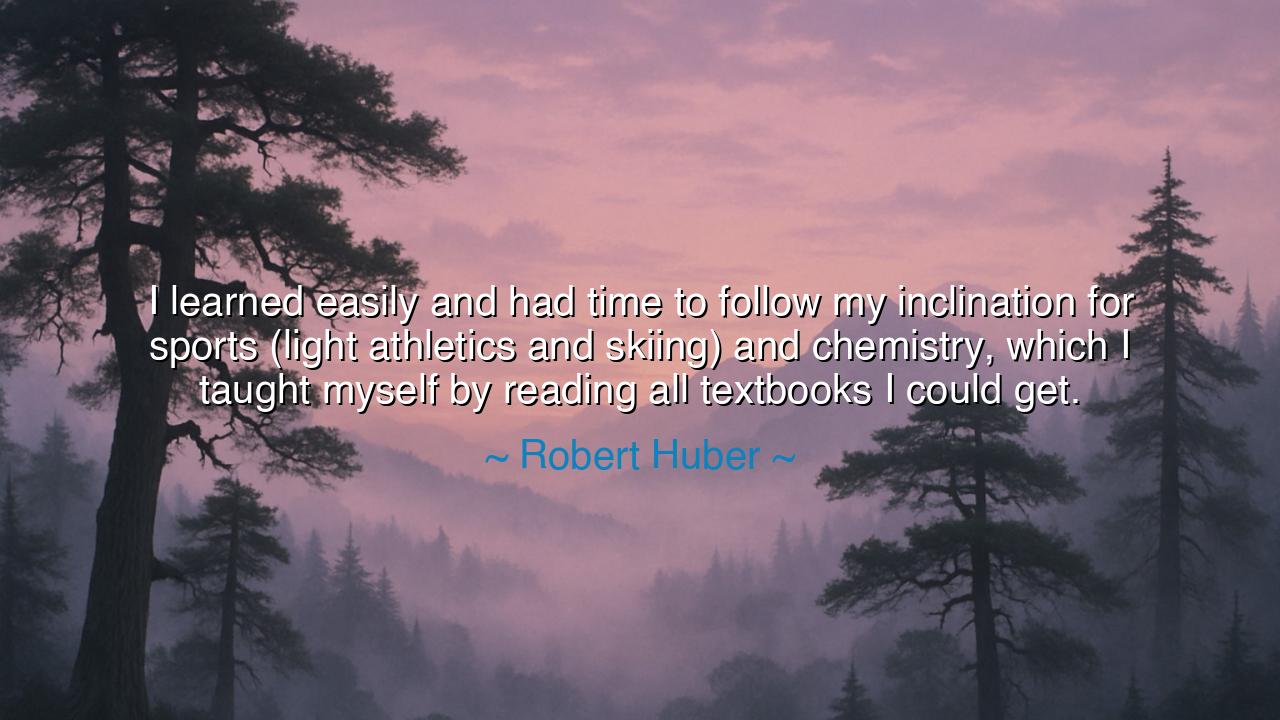
I learned easily and had time to follow my inclination for
I learned easily and had time to follow my inclination for sports (light athletics and skiing) and chemistry, which I taught myself by reading all textbooks I could get.






Hear the words of Robert Huber, seeker of knowledge and master of discipline, who declared: “I learned easily and had time to follow my inclination for sports (light athletics and skiing) and chemistry, which I taught myself by reading all textbooks I could get.” At first, this seems only a memory of youth, a description of a gifted mind at play. Yet within these lines lies the very pattern of greatness: the union of natural talent, curiosity, and the relentless pursuit of knowledge. He reveals that life’s highest achievements are born not from idleness, but from using one’s gifts with diligence and joy.
The meaning of this saying is twofold. On one hand, Huber speaks of learning—the ease with which knowledge came to him, and the hunger that pushed him beyond classrooms into the world of self-teaching. On the other, he speaks of balance—that even while feeding his mind with chemistry, he fed his body with sport, skiing and athletics, giving strength to both flesh and spirit. This harmony between intellect and physical discipline is the foundation upon which enduring greatness is built. To sharpen only the mind is to risk frailty; to train only the body is to lack wisdom. But to cultivate both is to rise toward the fullness of human potential.
The origin of this wisdom can be traced to the ancients. The Greeks, in their schools of philosophy and their gymnasia, exalted the harmony of body and mind. To them, an educated man must also be a man of physical discipline, for the two sharpen one another. Plato himself spoke of training both in music and in gymnastics, for one nurtured the spirit, the other the strength. Huber’s youthful pursuit of chemistry and sport stands in this same tradition, echoing the ancient call to live a life of balance, curiosity, and vigor.
Consider the story of Leonardo da Vinci, who, like Huber, was largely self-taught. Leonardo read every manuscript he could find, dissected bodies to understand anatomy, and sketched endlessly to master the workings of nature. Yet he was also a man of physical strength, able to bend iron horseshoes with his hands and to endure long journeys on foot. His genius did not come from the classroom alone, but from an unquenchable thirst for knowledge, paired with the discipline of the body. What Huber described of himself, Leonardo embodied centuries before: the marriage of curiosity and strength.
The lesson for us is clear: do not waste the gifts of the mind, nor neglect the discipline of the body. If knowledge comes easily, pursue it all the harder, for ease without effort breeds complacency. If it comes with difficulty, seek it with persistence, for effort will make it stronger. At the same time, give space for sport, for movement, for the cultivation of strength and endurance. For wisdom without health falters, and strength without wisdom wanders blindly.
Practical actions must follow. Read widely—books, articles, textbooks, anything that feeds your curiosity. Do not wait for teachers alone; become your own teacher, as Huber did, devouring what knowledge you can find. Train your body as well—run, walk, climb, or ski, for in movement you will find clarity of thought. Balance your days between mental striving and physical exertion, so that neither part of you lies dormant. In this way, you forge yourself into something greater than either half could achieve alone.
And so, child of tomorrow, heed the counsel hidden in Robert Huber’s reflection. Learn easily if you can, but learn diligently if you must. Pursue the things that awaken your curiosity, and chase them with relentless hunger. But also give time for sport, for movement, for the discipline of the body. For the man or woman who unites knowledge and strength becomes like the oak tree—its roots deep in wisdom, its trunk firm in discipline, its branches reaching toward the heights of human achievement.






AAdministratorAdministrator
Welcome, honored guests. Please leave a comment, we will respond soon